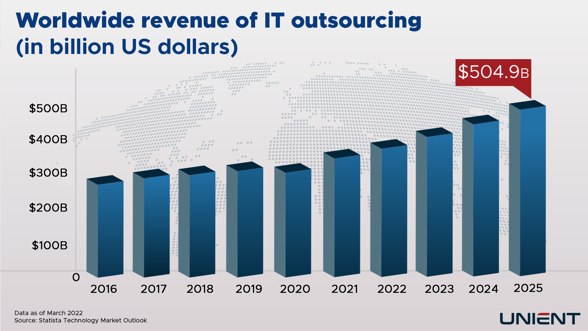Covid and Offshore Outsourcing: A Look Back and A Look Forward

THREE YEARS AGO, the first case of the novel coronavirus in Wuhan City was officially reported and to say that the world was forever changed would be an understatement. The full extent of such global scale devastation — not just with the lives and loves lost, but also the isolation it wrought — can never be adequately quantified.
Throughout history, pandemics have been instrumental in changing the course of human lives and radically changing societies, and not always for the worst. Amidst the devastation, pandemics can also trigger social and political awakenings, accelerate development in different fields, and give the environment much-needed time to recuperate.
From the Black Death to the Spanish Flu and to the most recent COVID-19, pandemics can end empires, spark trends, change laws, and shape our current and future existence — at least until the next pandemic comes along.
During the height of the lockdowns at the beginning of 2020, the biggest issues apart from saving lives were protecting jobs and supply chains. Although not all experts agree that we are living in a post-COVID era, what is indisputable is that life found a way, as it always does. As fast as the pandemic upended things, industries responded and adapted.
Some of the knock-off effects of the pandemic on the global economy and on specific industries are permanent. Naturally, healthcare has been impacted the most, but one other industry that warrants a second look is the offshore outsourcing industry.
India’s COVID-19 crisis which came to a head in the second quarter of 2021, is considered by many to be the worst in the world. India also happens to be one of the biggest offshore outsourcing destinations. In 2020, India held 65 per cent of the global market share in offshore BPO. The ensuing shutdown had far-reaching effects that fundamentally changed the entire offshore outsourcing industry.
Let’s take a look at some of the ways the COVID-19 pandemic impacted the offshore outsourcing industry.
Resiliency and Offshore Outsourcing Companies
Business continuity was the buzzword during the height of the pandemic. Businesses needed to survive. The crisis showed us how woefully unprepared the global economy was for this scale of disruption and how inadequate some national healthcare systems were.
In a popular TED Talk from 2015, Bill Gates cautioned the world about the looming threat of a pandemic and the need for improved medical facilities, testing capabilities, and research and development on highly infectious viruses. Sounds oddly prescient, doesn’t it? But according to many, the writing was on the wall. Given the frequency of pandemics throughout history and the improvement of global mobility, the COVID pandemic was a clear and emerging threat that no one paid attention to.


Various experts opined on whether COVID-19 was a Black Swan, a Grey Swan, or a White Swan event. A Black Swan event is a disruptor that is rare, a fluke, and beyond normal expectations. A Grey Swan event is a disruptor that is possible but unlikely. Finally, a White Swan event is a disruptor that can be seen coming.
Regardless of which color swan you subscribe to, one thing is for sure, industries were taught a lesson they won’t likely soon forget. Business continuity planning is now part of everyone’s agenda. Offshore outsourcing companies are continuously reassessing their service delivery models and beefing up mission-critical systems. They will be better prepared to handle disruptions in operations and will have organisation-wide strategies in place to ensure business continuity. This may include, for instance, investing in Robotic Process Automation (RPA) and AI technologies or capacitating employees for remote work.
From a client’s perspective, offshore outsourcing firms with multiple fulfilment centres will have the advantage as those who were badly burned by the lockdowns in certain offshore locations will most likely resort to geo-diversification of their outsourcing strategy to mitigate future risks.
The Outsourced Workforce and Global Talent Pools

THE GREAT RESIGNATION is the name given to the ongoing trend of workers quitting their jobs for reasons like shifting priorities (health and wellness, work-life balance), the search for higher pay, or the search for a flexible or hybrid work set-up. While mostly known as an American experience, every country in the world has their own version of this. This trend only exacerbated the pre-pandemic global talent shortage.
To bridge the talent gap and fill roles, organisations are increasingly turning to offshore outsourcing. Since hiring onshore and in-house employees is proving to be too costly or taking too long, access to a global talent pool by way of offshore outsourcing has become a much-needed lifeline. The global lockdowns also eroded any existing scepticism about remote-first or hybrid working environments as they gave both employers and employees a chance to try them out and experience their many benefits first-hand.

Remote and Hybrid Work
WHAT STARTED OUT AS A PUBLIC HEALTH NECESSITY is now the norm. The future (and the present) truly is hybrid. Even as offices resume their face-to-face operations, it is likely that remote working will always be an option. The widespread adoption of remote working brought about by COVID has also all but taken care of one of the greatest barriers to outsourcing: organisations of all sizes learned to work with distributed workforces and are now structured to be remote-friendly or even remote-first. This is also helped by the improvement and proliferation of communication and workflow management and collaboration tools.
As salaries for onshore hires increase, talent remains scarce and as the Great Resignation persists, offshore outsourcing is the best option. Since numerous studies also support the idea that productivity is not negatively impacted by remote working, what is stopping its widespread adoption?
THE ANSWER: nothing at all. It’s already happening. If a job can be done remotely, then it’s already being outsourced offshore either as an extension of the organisation or with a third-party service provider.
If a job can be done remotely, then it’s already being outsourced offshore either as an extension of the organisation or with a third-party service provider.
Digital Transformation Acceleration

IT IS WIDELY ACCEPTED that COVID accelerated digital transformation across all industries, especially in fintech and communications. It also increased cross-border data flow. The heavy reliance on and the urgent need for digital tools for communication, collaboration, data security and business continuity has organisations prioritising technology and innovations. This means partnering with third-party providers for faster, more competent, more efficient service and more affordable set-up. Offshore outsourcing is also a huge boon to smaller organisations that cannot afford to execute an in-house digital transformation programme.
Revenue Growth
COVID-19’S WORST-HIT industries include Airlines, Restaurants, Travel and Leisure and Automobiles. It may take years to recoup industry-wide and many businesses have shuttered for good. In contrast, industries that benefited the most include healthcare and pharmaceuticals, software and technology and outsourcing. The outsourcing industry as a whole is predicted to grow even more up until 2025.

This is fuelled by an ongoing talent shortage, the great demand for software-as-service and cloud-based solutions and an increase in comfort level in working with remote teams. Last, but probably still the most significant factor, is the cost savings. With organisations doing all they can to economise, a scalable offshore workforce is the logical choice.
Organisations and businesses will be dealing with the disruptions wrought by the pandemic for decades to come. On the flip side, if they rise to the occasion, they will also be reaping the rewards for decades to come. It’s up to each organisation to root out vulnerabilities and build resilience. Challenges in the offshore outsourcing industry will persist (COVID-related or otherwise)—so will innovations and creative solutions.
Are you looking for a reliable and experienced offshore outsourcing partner? Whether you’re new to the game or exploring other providers, we’d love to talk to you. Book a commitment-free consultation today.
 Australia
Australia India
India New Zealand
New Zealand Philippines
Philippines USA
USA